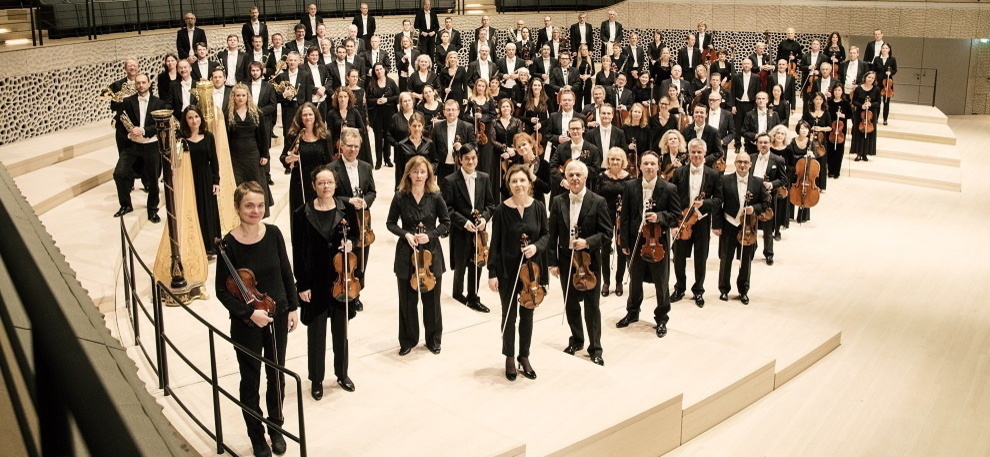Sun, Sep. 15, 2024, 11.00 am | Elbphilharmonie, Recital Hall
4th Academy Concert
Johann Sebastian Bach: Brandenburg Concerto No.4 in G major BWV 1049
Carl Philipp Emanuel Bach: Symphony No. 6 E major Wq 182 “Hamburger”
Johann Sebastian Bach Brandenburg Concerto No. 5 in D major BWV 1050
Felix Mendelssohn Bartholdy: Symphony No. 10 in B minor for string orchestra - “Youth Symphony”
Johann Sebastian Bach Brandenburg Concerto No. 6 in B flat major BWV 1051
Harpsichord and direction: Andreas Staier
Philharmonisches Staatsorchester Hamburg
Andreas Staier
Harpsichord and direction"Staier played the instrument with such a wealth of colors, so expressive, cantabile, sometimes profound, rumbling, or even introverted."
The pianist Andreas Staier first became world famous as a harpsichordist. After studying with Lajos Rovatkay and Ton Koopman, he worked for three years with the Musica Antiqua Köln. But Staier is far more than a virtuoso representative of so-called historical performance practice. Rather, one could describe him as a passionate sound seeker. Each work that the pianist undertakes is not only analyzed in terms of its structure, but also explores the historical situation in which it originated. Through his meticulous approach, he has opened up completely new interpretive approaches and made surprising listening experiences possible. This is why he also works with instrument makers to explore special nuances of sound – be it works of the 16th century such as the English virginalists, Bach's Goldberg Variations, the Diabelli Variations of the late Beethoven or the last piano works by Brahms. Staier has also always turned to lesser known composers when he could discover original aspects in their works, such as Sebastián de Albero or Josef Antonín Štěpán.
His commitment does not end with the music of the 19th century. This is shown by Staier's collaboration with the French composer Brice Pauset (b. 1965) from whom several compositions have been commissioned. The Kontra Sonata (2000), a hybrid of Schubert's Sonata in A minor D 845 and Pauset's Kontrakompositionen is a prime example of Staier's epoch-crossing musical thinking. Staier himself used the time during the Corona Pandemic to finish his composition Sechs Cembalostücke which he puts in connection with Bach’s Preludium and Fugue E Major of the Well-Tempered Clavier Book 2. The work was premiered at the Philharmonie in Cologne in January 2023, will be published by Editions Lemoine, and will be released by Outhere Music in 2024.
All this is documented on numerous recordings, almost all of which have received prestigious awards. Staier himself has often been honored for his work. He was Artist in Residence at the AMUZ in Antwerp from 2012-2016, and between 2011 and 2021 at the Opéra de Dijon.
Whether at the harpsichord or the fortepiano, Staier performs at numerous renowned music festivals worldwide with ensembles such as the Freiburger Barockorchester, Concerto Köln, the Akademie für Alte Musik Berlin or the Orquestra Barroca Casa da Música Porto with which he recorded À Portuguesa with works by Spanish composers for harmonia mundi in October 2018. For the Beethoven jubilee, Staier presented his album Ein neuer Weg - Beethoven, based on the three op. 31 piano sonatas and the variations 34 and 35, which received rave reviews. His recording of the Well-Tempered Clavier Book 2 is considered a reference recording, and he has since released Book 1. Together with Roel Dieltiens he also released Beethoven's Cello Sonatas op. 102 and the Bagatelles op. 119 & 126.
Longtime musical partners include the pianists Alexander Melnikov, Christine Schornsheim and Tobias Koch, the violinists Isabelle Faust and Petra Müllejans or the tenor Christoph Prégardien. Andreas Staier maintains a close collaboration with Daniel Sepec and the cellist Roel Dieltiens, with whom he has performed well-known compositions for piano trio since 2010. The trio released an album of the Schubert piano trios in 2016.
Staier's extensive interests and abilities have made him a much sought-after educator from an early age. In addition to masterclasses worldwide, he was Professor of Harpsichord and Fortepiano at the Schola Cantorum Basiliensis from 1987-1995. During the 2017/18 season, Andreas Staier was a Fellow at the Wissenschaftskolleg zu Berlin.
For several years, Andreas Staier also has been performing as a conductor and orchestra leader.
Philharmonisches Staatsorchester Hamburg
OrchesterThe Philharmonic State Orchestra is Hamburg’s largest and oldest orchestra, looking back on many years of musical history. When the “Philharmonic Orchestra” and the “Orchestra of the Hamburg Municipal Theatre” merged in 1934, two tradition-steeped orchestras combined. Philharmonic concerts have been performed in Hamburg since 1828, artists such as Clara Schumann, Franz Liszt and Johannes Brahms being regular guests of the Philharmonic Society. The history of the opera company goes back even further: Hamburg has been home to musical theatre since 1678, even if a regular opera or theatre orchestra was only formed later. To this day, the Philharmonic State Orchestra has embodied the sound of the Hansa City, a concert and opera orchestra in one.
During its long history, the orchestra encountered great artist personalities. Apart from composers of the 18th, 19th and 20th centuries, such as Telemann, Tchaikovsky, Strauss, Mahler, Prokofiev and Stravinsky, since the 20th century chief conductors such as Karl Muck, Joseph Keilberth, Eugen Jochum, Wolfgang Sawallisch, Horst Stein, Aldo Ceccato, Christoph von Dohnányi, Gerd Albrecht, Ingo Metzmacher and Simone Young have shaped the orchestra’s sound. Renowned conductors of the pre-war era such as Otto Klemperer, Wilhelm Furtwängler, Bruno Walter, Karl Böhm and Hans Schmidt-Isserstedt gave brilliant performances, as did outstanding conductors of our times: suffice it to mention Christian Thielemann, Semyon Bychkov, Kirill Petrenko, Adam Fischer and Sir Roger Norrington.
Starting with the 2015/2016 season, Kent Nagano has taken on the position of Hamburg’s General Music Director and Chief Conductor of the Philharmonic State Orchestra and the Hamburg State Opera and since June 2023 also its honorary conductor. In his first season Kent Nagano initiated a new project, the Philharmonic Academy, focusing on experimentation and chamber music. In 2016, Nagano and the Philharmonic toured South America, followed by concert tours to Spain and Japan in 2019, and in the spring of 2023, the Philharmonic State Orchestra made its debut at New York's Carnegie Hall under his direction, which was acclaimed by audiences and the press. Since 2017 Kent Nagano and the Philharmonic State Orchestra have continued the traditional Philharmonic Concerts at the new Elbphilharmonie, for which they commissioned Jörg Widmann to compose the oratorio ARCHE, which was given its world premiere during the hall’s opening festivities. The concert recording has been released by ECM, for which Widmann received the OPUS KLASSIK as Composer of the Year 2019, and ARCHE was performed again in 2023 to great acclaim.
The Philharmonic State Orchestra offers approximately 35 concerts per season and performs more than 240 performances per year at the Hamburg State Opera and the Hamburg Ballet John Neumeier, making it Hamburg’s busiest orchestra. The stylistic bandwidth covered by the 140 musicians, ranging from historically informed performance practice to contemporary works and including concert, opera and ballet repertoire, is unique throughout Germany. Chamber Music has a long tradition at the Philharmonic State Orchestra: what began in 1929 with a concert series for chamber orchestra has been continued since 1968 by a series of chamber music only.
In 2008 Simone Young and the Philharmonic State Orchestra won the Brahms Award of the Schleswig-Holstein Brahms Society. The orchestra has recorded the complete Ring by Wagner as well as the complete symphonies of Johannes Brahms and Anton Bruckner – the latter in the rarely-performed original versions – as well as works by Mahler, Hindemith and Berg, and has released DVDs of opera and ballet productions by Hosokawa, Offenbach, Reimann, Auerbach, J.S. Bach, Puccini, Poulenc and Weber.
The members of the Philharmonic State Orchestra feel equally beholden to Hamburg’s musical tradition and responsible for the city’s artistic future. Since 1978 the musicians have been participating in education programmes in Hamburg’s schools. Today, the orchestra maintains a broad education programme, including school and kindergarten visits, patronage for music projects, introductory events for children and family concerts. The orchestra’s own academy prepares young musicians for their professional careers. The Philharmonic’s musicians thereby make an equally enjoyable and valuable contribution to tomorrow’s music education in the music metropolis of Hamburg.
The fundamentally humanistic sound ideal of Johann Sebastian Bach and his son Carl Philipp Emanuel Bach meets the youthful romantic gesture of Felix Mendelssohn Bartholdy: In the 4th Academy Concert, the series of Bach's Brandenburg Concertos, which began in the 1st Academy Concert, continues. A music that is so popular and admired that it flew through space on a data disk on board the “Voyager 2” space probe in 1977 - and is now back in Hamburg. His Symphony No. 6, nicknamed “Hamburger,” shows that Carl Philipp Emanuel Bach does not have to hide from his famous father’s overwhelming legacy. A piece of breathtaking tension with rich tones and a humorous wink. The latter Bach served as a model for another composer, namely Felix Mendelssohn Bartholdy. The “Youth Symphony” by the twelve-year-old already foreshadows the composer’s great visionary potential.





